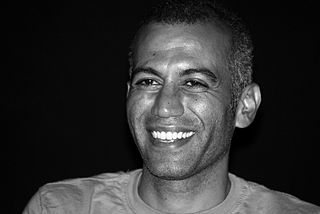Related Research Articles

Muhammad Hosni El Sayed Mubarak was an Egyptian politician and military officer who served as the fourth president of Egypt from 1981 to 2011.
The Muslim Brotherhood is an Islamic organization that was founded in Ismailia, Egypt by Hassan al-Banna in March 1928 as an Islamist religious, political, and social movement. The group spread to other Muslim countries but has its largest, or one of its largest, organizations in Egypt, where for many years it has been the largest, best-organized, and most disciplined political opposition force, despite a succession of government crackdowns in 1948, 1954, 1965 after plots, or alleged plots, of assassination and overthrow were uncovered. Following the 2011 Revolution the group was legalized, and in April 2011 it launched a civic political party called the Freedom and Justice Party (Egypt) to contest elections, including the 2012 presidential election when its candidate Mohamed Morsi became Egypt's first democratically elected president. One year later, however, following massive demonstrations, Morsi was overthrown by the military and arrested. As of 2014, the organization has been declared a terrorist group by Russia, Egypt, UAE, Saudi Arabia and is once again suffering a severe crackdown.
Habib Ibrahim El-Adly is a former Egyptian politician. He served as interior minister of Egypt from November 1997 to January 2011. He was the longest serving interior minister under President Hosni Mubarak.

Presidential elections were held in Egypt in 2012, with the first round on 23 and 24 May 2012 and the second on 16 and 17 June. They were the first democratic presidential elections in Egyptian history. The Muslim Brotherhood declared early 18 June 2012, that its candidate, Mohamed Morsi, won Egypt's presidential election, which would be the first victory of an Islamist as head of state in the Arab world. It was the second presidential election in Egypt's history with more than one candidate, following the 2005 election, and the first presidential election after the 2011 Egyptian revolution which ousted president Hosni Mubarak, during the Arab Spring. However, Morsi's presidency was brief and short-lived, and he later faced massive protests for and against his rule, only to be ousted in a military coup in July that year.

The 2011 Egyptian revolution, also known as the 25 January Revolution, began on 25 January 2011 and spread across Egypt. The date was set by various youth groups to coincide with the annual Egyptian "Police holiday" as a statement against increasing police brutality during the last few years of Hosni Mubarak's presidency. It consisted of demonstrations, marches, occupations of plazas, non-violent civil resistance, acts of civil disobedience and strikes. Millions of protesters from a range of socio-economic and religious backgrounds demanded the overthrow of Egyptian President Hosni Mubarak. Violent clashes between security forces and protesters resulted in at least 846 people killed and over 6,000 injured. Protesters retaliated by burning over 90 police stations across the country.

The Revolutionary Socialists (RS) are a Trotskyist organisation in Egypt originating in the tradition of 'Socialism from Below'. Leading RS members include sociologist Sameh Naguib. The organisation produces a newspaper called The Socialist.

The Supreme Council of the Armed Forces is a statutory body of between 20 and 25 senior officers of the Egyptian Armed Forces, and is headed by Field Marshal Abdel Fattah al-Sisi and Lieutenant General Mohamed Ahmed Zaki. The council is convened only in cases of war or great internal emergencies.

Parliamentary elections were held in Egypt from 28 November 2011 to 11 January 2012, following the revolution that ousted President Hosni Mubarak, after which the Supreme Council of the Armed Forces (SCAF) dissolved Parliament. However the dissolution was ruled unconstitutional and Parliament was reinstated. Originally, the elections had been scheduled to be held in September 2011, but were postponed amid concerns that established parties would gain undue advantage.

The Egyptian Crisis was a period that started with the Egyptian revolution of 2011 and ended with beginning of the presidency of Abdel Fattah el-Sisi in 2014. It was a tumultuous three years of political and social unrest, characterized by mass protests, a series of popular elections, deadly clashes, and military reinforcement. The events have had a lasting effect on the country's current course, its political system and its society.

The following is a chronological summary of the major events that occurred during the Egyptian Revolution of 2011, after Hosni Mubarak's resignation. Protests and riots led to the deaths of hundreds, injuries of thousands and the arrests of tens of thousands. Millions have mobilised the streets since the revolution.
The trials and judicial hearings following the 2011 Egyptian Revolution were a series of legal moves to establish accountability among the various Egyptian government officials and prominent businessmen.

Hossam el-Hamalawy is an Egyptian journalist, blogger, photographer and socialist activist. He is a member of the Revolutionary Socialists and the Center for Socialist Studies.

Human rights in the post-Mubarak transition have been the subject of concern and controversy since the 2011 Egyptian revolution. The Supreme Council of the Armed Forces (SCAF) Arabic: المجلس الأعلى للقوات المسلحة, al-Maǧlis al-ʾAʿlā lil-Quwwāt al-Musallaḥah in particular have been the focus of concerns about human rights violations. The SCAF, which consists of a body of 20 senior officers in the Egyptian military, was handed the power to govern Egypt after the ouster of President Hosni Mubarak on 11 February 2011 as a consequence of the revolution.

Mona Seif is an Egyptian human rights activist known for her participation in dissident movements during and after the 2011 Egyptian revolution, for her creative use of social media in campaigns, and for her work to end military trials for civilian protesters. She is a biology graduate student, investigating the BRCA1 breast cancer gene.

Wael Khalil is an Egyptian political activist known for his criticism of the Mubarak regime, his activity during the 2011 Egyptian revolution, and his blog WaELK.net which covers government, activism and sports.
On 1 February 2012, a massive riot occurred at Port Said Stadium in Port Said, Egypt, following an Egyptian Premier League football match between Al Masry and Al Ahly. Seventy-four people were killed and more than 500 injured after thousands of Al Masry fans stormed the stadium stands and the pitch following a 3–1 victory by their club and violently attacked Ahly fans, using clubs, stones, machetes, knives, bottles, and fireworks, trapping them inside the Al Ahly partition of the stadium. Many of the deaths were due to police refusal to open the stadium gates, trapping the Ahly fans inside, leaving some to die, and others being killed in a stampede while trying to escape. Civil unrest and severe clashes continued until 11 February, but general strikes ended on 13 February. Riots erupted in Cairo, Alexandria, and Suez. Police fired tear gas at protesters; thus, clashes erupted on the streets due to tear gas battles. Unrest calmed and ended on 13 February.

Khaled Ali is an Egyptian lawyer and activist. He is known for his advocacy for reform of government and private sector corruption and for promoting social justice and labor rights. He is the former head of the Egyptian Center for Economic and Social Rights (ECESR), and co-founder of the Front for Defending Egyptian Protesters and the Hisham Mubarak Law Center (HMLC).
Following the 2011 Egyptian revolution, the Muslim Brotherhood in Egypt became one of the main forces contending for political power in Egypt against the Supreme Council of the Armed Forces (SCAF) and other established centers of the former Hosni Mubarak regime.

Ahmed Douma is an Egyptian activist and blogger, who has been arrested under each consecutive Egyptian government in recent years. He is a member of the Egyptian Popular Current. Having been in prison since 2013, he was released on 19 August 2023 following a presidential pardon.

The Girl in the Blue Bra is the name given to an image of an Egyptian woman who participated in the Tahrir Square protests in opposition to Egypt's Supreme Council of the Armed Forces (SCAF), the military coup that ousted Hosni Mubarak during the 2011 Egyptian Revolution in opposition to Mubarak's presidency.
References
- ↑ "Law 162 of 1958 Emergency Law" (PDF) (in Arabic). Retrieved 2 December 2023.
- 1 2 3 Ellaboudy, Ahmed (19 May 2020). "Emergency Law Amendments to Fight Covid-19 in Egypt: Putting the Poison in the Honey". Verfassungsblog. doi:10.17176/20200519-133749-0 . Retrieved 2 December 2023.
- ↑ Kassem, May (1999). In the guise of democracy: governance in contemporary Egypt. Garnet & Ithaca Press. pp. 57–58.
- ↑ Shehata, Samer (26 March 2004). "Egypt After 9/11: Perceptions of the United States". Contemporary Conflicts. Archived from the original on 15 July 2006. Retrieved 30 January 2011.
- 1 2 3 "Law 1958/162 (Emergency Law)". Edinburgh Middle East Report. Retrieved 2 April 2010.(registration required)
- 1 2 3 Williams, Daniel (30 April 2006). "Egypt Extends 25-Year-Old Emergency Law". The Washington Post. Retrieved 29 January 2011.
- 1 2 Caraley, Demetrios (April 2004). American Hegemony: Preventive War, Iraq, and Imposing Democracy . Academy of Political Science. ISBN 1-884853-04-8.
- 1 2 3 Mohy El Deen, Sherif (10 August 2017). "Egypt's Unexceptional State of Emergency". Arab Reform Initiative. Retrieved 9 December 2023.
- 1 2 Egyptian Organisation for Human Rights (28 May 2008). "Egypt and The Impact of 27 years of Emergency on Human Rights". Archived from the original on 29 January 2011. Retrieved 29 January 2011.
- ↑ Simon Apiku. Egypt to lift 25-year-old emergency laws. Middle East On-line, 23 March 2006. "Middle East Online". Archived from the original on 24 August 2006. Retrieved 16 April 2006.
- ↑ Joelle Bassoul. Egypt renews state of emergency for two years. Middle East On-line, 1 May 2005. Archived 2015-02-18 at the Wayback Machine
- ↑ Adam Morrow and Khaled Moussa al-Omrani. EGYPT: Despair Over Two More Years of Martial Law.Inter Press Service News Agency. "EGYPT: Despair over Two More Years of Martial Law". Archived from the original on 18 May 2009. Retrieved 20 June 2009.
- ↑ Slackman, Michael (12 May 2010). "Egyptian Emergency Law Is Extended for 2 Years". The New York Times. ISSN 0362-4331 . Retrieved 31 January 2024.
- ↑ Choney, Suzanne (27 January 2011). "Egyptian bloggers brave police intimidation". NBC News . Retrieved 28 January 2011.
- ↑ Mayer, Jane (30 October 2006). "The C.I.A.'s Travel Agent". The New Yorker. Archived from the original on 29 December 2010. Retrieved 28 January 2011.
- ↑ Shenker, Jack (22 November 2010). "Egyptian Elections: Independents Fight for Hearts and Minds in 'Fixed Ballot'". The Guardian. UK. Archived from the original on 28 January 2011. Retrieved 28 January 2011.
- ↑ "Egypt: Keep Promise to Free Detainees by End of June: Joint Statement" (Press release). Amnesty International. 29 June 2010. Retrieved 4 February 2011.
- ↑ Holder, R. Clemente (July–August 1994). "Egyptian Lawyer's Death Triggers Cairo Protests". Washington Report on Middle East Affairs . Retrieved 31 January 2011.
- ↑ "Enough is still enough". Al-Ahram Weekly. 8 September 2005. Archived from the original on 19 September 2014. Retrieved 17 January 2014.
- ↑ R. Clemente Holder (August 1994). "Egyptian Lawyer's Death Triggers Cairo Protests". Washington Report on Middle East Affairs. Retrieved 26 January 2011.
- ↑ "Legal experts say amending, extending emergency law illegal". Daily News Egypt. 12 September 2011. Archived from the original on 22 November 2011. Retrieved 17 January 2014.
- ↑ "Egypt's ruling generals to partially lift emergency law". BBC. 24 January 2012. Retrieved 17 January 2014.
- ↑ Othman, Dalia (31 May 2012). "State of emergency ends, military council says will not renew". Egypt Independent. Retrieved 31 May 2012.
- ↑ "Egypt lifts unpopular emergency law". CNN. 31 May 2012. Retrieved 31 May 2012.
- ↑ "Egypt state of emergency lifted after 31 years". BBC News. 31 May 2012. Retrieved 4 December 2023.
- ↑ Kirkpatrick, David D. (14 June 2012). "Egypt Reimposes Martial Law, Ahead of Closely Watched Ruling". The New York Times. Retrieved 14 June 2012.
- ↑ "Egypt decree grants arrest powers to military". Al Jazeera. 13 June 2012. Retrieved 14 June 2012.
- ↑ Kirkpatrick, David D. (18 June 2012). "Egypt's Ruling Generals Soften Tone as Islamist Wins Presidency". The New York Times. Retrieved 18 June 2012.
- ↑ Londoño, Ernesto (13 June 2012). "Egypt's military given power to detain civilians days before presidential vote". The Washington Post. Retrieved 19 June 2012.
- ↑ "Some cry 'coup' as Egypt's highest court annuls parliament, military extends power". Mohamed Fadel Fahmy and Josh Levs. CNN. 14 June 2012. Retrieved 14 June 2012.
- ↑ "Egypt declares state of emergency". Al Jazeera English. 14 August 2013. Retrieved 17 January 2014.
- ↑ "Egypt in state of emergency as clashes leave 278 dead - World - CBC News". Archived from the original on 10 September 2013. Retrieved 17 February 2015.
- ↑ "State of emergency and curfew to officially end on Thursday". Ahram Online. 13 November 2013. Retrieved 10 September 2021.
- ↑ "Egypt declares state of emergency in Sinai". Al Jazeera. 25 October 2014. Retrieved 31 January 2024.
- ↑ "Egypt extends North Sinai state of emergency for 3rd time this year". Ahram Online . 28 October 2015. Retrieved 10 September 2021.
- ↑ "Egypt declares state of emergency after church bombings". www.aljazeera.com. Retrieved 14 September 2021.
- ↑ Samaan, Magdy; Walsh, Declan (9 April 2017). "Egypt Declares State of Emergency, as Attacks Undercut Promise of Security". The New York Times. ISSN 0362-4331 . Retrieved 2 December 2023.
- ↑ "Egypt Lifted its State of Emergency: What Now?". Tahrir Institute for Middle East Policy . 10 November 2021. Retrieved 2 December 2023.
- ↑ Yee, Vivian (25 October 2021). "Egypt's Leader Ends State of Emergency, Says It's No Longer Needed". The New York Times. ISSN 0362-4331 . Retrieved 23 December 2021.
- ↑ "Egyptian president extends state of emergency for 3 months". Ahram Online. MENA. 22 July 2021. Retrieved 10 September 2021.
- ↑ "Egypt: Abolish the Emergency State Security Courts and End Miscarriages of Justice". International Commission of Jurists. 24 January 2023. Retrieved 31 January 2024.
- ↑ "Egypt: Stop trials by emergency courts". Amnesty International. 31 October 2021. Retrieved 31 January 2024.